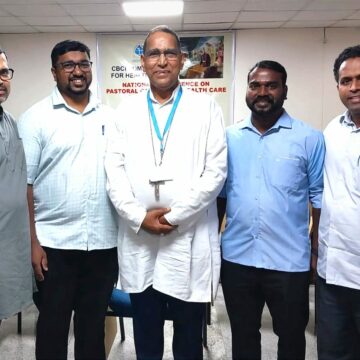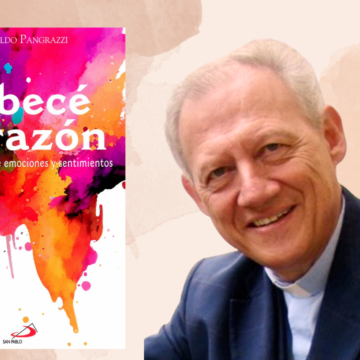 The world of health poses numerous challenges to the Church community. When seen as appeals launched by God and addressed appropriately, these challenges offer an opportunity to communicate, with creative faithfulness, the message of the redemptive love of Christ not only to those who suffer in body and in spirit but also to those who are involved in the promotion of health.
The world of health poses numerous challenges to the Church community. When seen as appeals launched by God and addressed appropriately, these challenges offer an opportunity to communicate, with creative faithfulness, the message of the redemptive love of Christ not only to those who suffer in body and in spirit but also to those who are involved in the promotion of health.
The development of science and technology, together with numerous scientific-technical, cultural, religious and ethical changes, have transformed the world of health and health care into one of the most important and complex crossroads of society, through which almost all of the population passes. It has been rightly said that human life has come out of the domestic walls to be expressed, at its most critical and decisive moments, in the health-care world. It is in this way that the fundamental events of human existence unfold (cf. DH, n. 2): birth, the possible recovery of health, ageing, death; that the most fascinating and worrying scientific research takes places; and that the fundamental questions of contemporary man can be understood, those relating to the meaning of life, to the reasons for suffering and for death. It is no wonder, therefore, that the health-care world has become the setting where the various projects about man, his happiness and his future, as well as different conceptions of society, collide.
Amongst the factors that are at the origins of the current organisation of the health-care world, we should refer to the process of the secularisation of care for the sick, the advance of medical science and technology, and the development of modern hospitals.
Great social and organisational changes have been matched by the rise of a different culture, whose characteristics can be identified in a new concept of health and illness, in an increasing awareness by the population of its rights to physical and mental wellbeing, and in the gradual dissociation of care for patients from the Christian vision of man.
A favourable terrain for the shaping of this new vision has been the process of secularisation which germinated with the Enlightenment and steadily matured over subsequent centuries. Like all other human universes, the health-care world is also dominated by awareness of its autonomy in relation to the sacred and the development of a series of forms of knowledge and technology directed towards meeting the problems posed to humanity in this area of human life.
Side by side with decidedly positive aspects, in secularisation we can also see the seeds of ways of being and acting that counter an authentically human and Christian anthropological vision, ‘a certain Promethean attitude which leads people to think that they can control life and death’ (EV, n. 15), the tendency to remove the negative aspects from existence – suffering, illness and death –, the move from the medicine of needs to the medicine of desires.
In care and assistance for the sick as well – elements that have undergone an enormous positive development – one can identify certain limits consequent upon medical and organisational advance. On the one hand, there is the denunciation of an accentuated medicalisation of all the segments of existence (birth, growth, aging, death) and the reduction of human, relational, existential phenomena to phenomena that are merely technical in character, and, on the other, the need becomes ever more compelling to humanise service to the sick, which has been made more problematic by the interference of political and economic interests, by bureaucracy that is at times oppressive, by a methodology of work that is based upon rapidity and efficiency, by conflicts over contracts, and above all else by a deterioration of our scale of values which makes seeing a patient as a person more arduous.
It is to this world of health care, which is characterised by lights and shadows, that as a Church we are called to open ourselves, animated by hope, by a spirit of cooperation, and by an awareness that we will render through our service an essential contribution to the salvation of man.
Two approaches help us in this openness: dialogue and interaction. Dialogue fosters objective knowledge about what is taking place in the world of health and health care. Through an intelligent and respectful conversation with those who are involved in the fields of health-care , both as patients and as professional or volunteer workers, we can realise the complexity that characterises the world in which they are called to operate, perceiving both its positive aspects and its limits.
By overcoming emotional reactions and moralistic approaches it will be possible to realise that in the world of health and health care the cultural atmosphere of the society in which it operates is breathed in. It is rightly observed that it is not medical doctors but society itself that is judged by the world in which it offers itself and dies. Indeed, the behaviour both of patients and of health-care workers is rooted in the culture of the society in which they live and work.
 In the world of health and health care, indeed, the ambivalences that characterise our culture are present. A universalist openness and an increased sensitivity towards the rights of all citizens is opposed by a weakening in ethical awareness of existence, with a consequent loss of the meaning of work, faithfulness, sacrifice, and sharing. An upholding of the value of life, of the dignity of the person, of health, of the accompanying of patients…is often contradicted by a banalisation of birth, by a removal of death, by a reduction of health to physical vitality alone, and by the marginalisation of certain categories of sick people. Impulses involving great generosity are counterbalanced by forms of behaviour that are rooted in a subjectivistic and relativistic mentality according to which the only and incontestable point of reference for the choices that have to be made is our own subjective and changing opinion or even our own selfish interests or whims.
In the world of health and health care, indeed, the ambivalences that characterise our culture are present. A universalist openness and an increased sensitivity towards the rights of all citizens is opposed by a weakening in ethical awareness of existence, with a consequent loss of the meaning of work, faithfulness, sacrifice, and sharing. An upholding of the value of life, of the dignity of the person, of health, of the accompanying of patients…is often contradicted by a banalisation of birth, by a removal of death, by a reduction of health to physical vitality alone, and by the marginalisation of certain categories of sick people. Impulses involving great generosity are counterbalanced by forms of behaviour that are rooted in a subjectivistic and relativistic mentality according to which the only and incontestable point of reference for the choices that have to be made is our own subjective and changing opinion or even our own selfish interests or whims.
An alliance with the positive forces that are present in the world of health and health care should be accompanied by dialogue. This approach becomes necessary when one thinks that the new context of health care has been created outside the Church and often against the forms that her charitable help managed for centuries. How can one ignore that medicine and the social services have extended their influence to the point of determining the forms of human behaviour that should be adopted? The professionals of these sciences define and solve the problems that trouble people at all levels, including the ethical level, and become specialists in the fields of abortion, sterilisation and organ transplants.
 0 The linking of dialogue with interaction is a task that should be maintained with perseverance. Indeed, if dialogue fades we run the risk of being transformed into a juxtaposed presence, acting when the world of health and health care has already carried out its projects without us. Neglecting interaction involves forgoing gospel values, opting for an exaggerated horizontal approach that deforms the nature of our evangelising mission. A harmonisation of these two approaches makes us ready to project humility with those who are involved in the world of health and health care, in a spirit of service, strong in the belief that faith is essential to the success of the projects of men.
0 The linking of dialogue with interaction is a task that should be maintained with perseverance. Indeed, if dialogue fades we run the risk of being transformed into a juxtaposed presence, acting when the world of health and health care has already carried out its projects without us. Neglecting interaction involves forgoing gospel values, opting for an exaggerated horizontal approach that deforms the nature of our evangelising mission. A harmonisation of these two approaches makes us ready to project humility with those who are involved in the world of health and health care, in a spirit of service, strong in the belief that faith is essential to the success of the projects of men.
It is in this spirit that we are called to read the words of the Second Vatican Council, applying them in particular to those who work in the world of health and health care: ‘The joys and the hopes, the griefs and the anxieties of the men of this age, especially those who are poor or in any way afflicted, these are the joys and hopes, the griefs and anxieties of the followers of Christ. Indeed, nothing genuinely human fails to raise an echo in their hearts’ (GS, n. 1)














Camillians on Facebook
Camillians on Twitter
Camillians on Instagram